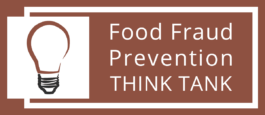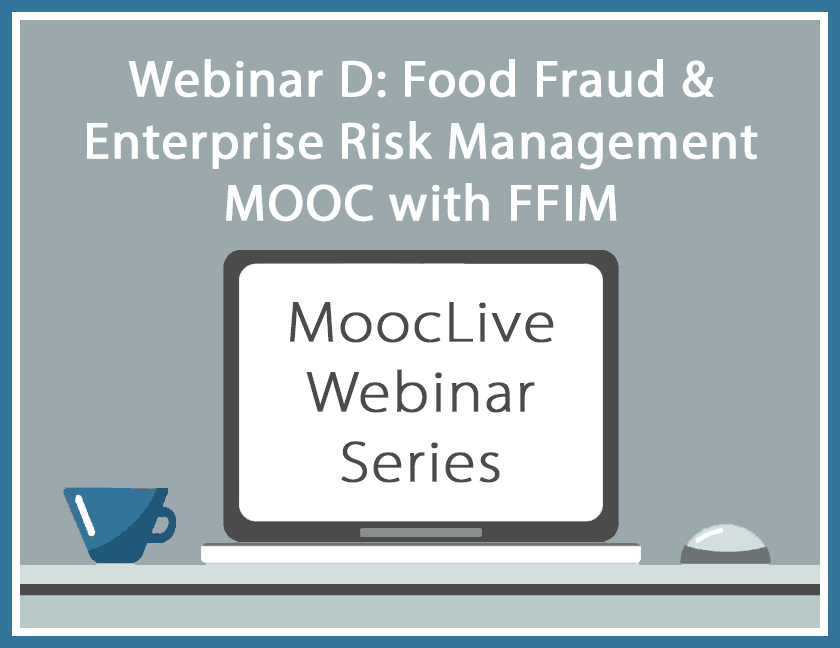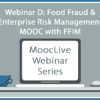Food Fraud Prevention MoocLive Webinar D: Food Fraud & Enterprise Risk Management MOOC with the Food Fraud Implementation Method – June 9,11,16 &18,2025
$250.00
DATES: June 9, 11, 16 & 18, 2025 (two hours each over 4 days)
TIMES ((Eastern Time Zone US/New York): 10:00 a.m. – 12:00 noon
LOCATION: Live webinar
INSTRUCTOR: Dr. John W. Spink, PhD
ATTENDEES: All
CERTIFICATE: Included, upon completion of final quiz
OFFICE HOURS: One virtual “office hours” meeting (half hour) is included
SUMMARY: A live, interactive webinar version of our on-demand asynchronous MOOCs, led by Dr. Spink, that covers the COSO-based Enterprise Risk Management (ERM) concepts that apply to food fraud prevention resource allocation decision-making. Without the final step of each company or enterprise determining ‘how much is enough,’ the food fraud prevention strategy is not complete.
This course content is based on multiple research projects and over fifty scholarly articles (see list of publications).
Often, training programs or empirically-based research recommendations provide unhelpful risk decision-making recommendations such as ‘assess the problem,’ ‘decide on a response plan,’ or ‘get a seat at the table with the C-suite.’ Enterprise Risk Management (ERM/COSO) is the foundation to define risk tolerance and the ‘how much is enough’ threshold. The Food Fraud Implementation Method (FFIM) is a step-by-step process to create and update the Food Fraud Prevention Strategy (FFPS). This process is based on the Food Fraud Prevention Cycle (FFPC).
Why Attend:
- Thoroughly understand the Enterprise Risk Management (ERM/COSO) fundamental concepts and the application to food fraud prevention. This includes the COSO-type two-step process, from ‘initial screening’ to ‘detailed assessment.’
- Examine the process to determine the likelihood and consequence that will define the risk tolerance.
- Add to your overall expertise and insight on food fraud prevention.
Deliverables:
- Upon completion, attendees will have a clear understanding of the broad needs to combine a food fraud assessment calibrated to the food safety assessment, which is integrated with the overall enterprise quality and risk assessments.
- Attendees will be educated on the applicable Enterprise Risk Management (ERM/ COSO) based methods as well as the application to the Food Fraud Prevention Cycle (FFPC) and in a Food Fraud Prevention Strategy (FFPS).
- Attendees will receive a Food Fraud Trends update presentation as part of the webinar.
Overview:
This webinar content is based on the ERM MOOC, with additional content from the Food Fraud Implementation Method (FFIM). These are complementary since the correlation of the food fraud vulnerability assessment to the overall enterprise-wide risk tolerance is crucial to supporting a logical resource-allocation decision-making process. After assuring the food fraud vulnerability assessment is calibrated to the enterprise-wide risk tolerance, it is then important to connect this to an all-inclusive prevention strategy. This prevention strategy is created, implemented and managed through the Food Fraud Implementation Method (FFIM).
Enterprise Risk Management (ERM)
This webinar begins with the Food Fraud & Enterprise Risk Management MOOC. This advanced course in the Food Fraud Prevention training series introduces resource-allocation decision-making based on the COSO Enterprise Risk Management system. A key to efficient implementation of a food fraud prevention strategy is translating the food fraud vulnerability into the ERM assessment system. ERM, or an ERM-like system, is a compliance requirement in the Sarbanes-Oxley Act for US public companies (and some form of the system is usually required by all private and international companies.) The content begins with an introduction to ERM and COSO and then presents examples that apply directly to food fraud. Next, the content provides “how to start” and “how much is enough” guidance for implementation, including case study examples. The case study examples offer step-by-step “how to start” guidance.
Food Fraud Implementation Method (FFIM)
The webinar then continues with an expanded focus on the implementation of the Food Fraud Prevention Strategy (FFPS). The creation, implementation and management of the FFPS has been shaped into the Food Fraud Implementation Method (FFIM). This is a structured approach and step-by-step method to address the compliance requirement for a prevention strategy. The basic scoping concepts were published in several peer-reviewed, scholarly journal Articles (Spink Et. Al, 2016 & Spink, Et. Al, 2017). Later, the management system was converted to a process that is the Food Fraud Prevention Cycle (FFPC) (Spink Et. Al, 2019). This follows a structured method to create, implement, and manage a food fraud prevention strategy.
MoocLive Format and Resources:
- Recommended attendees include employees who are recently assigned to the food fraud prevention group, or experienced employees wanting a refresher of the overarching concepts.
- Scheduled, live online instruction with Dr. Spink, including interactive Q&A.
- Food Fraud Trends Update presentation included, which will cover insights and hot topics.
- Pre-event survey for submitting your questions.
- Post-webinar quiz to earn your Certificate of Completion for the ERM MOOC, which counts toward your Master Certificate in Food Fraud Prevention.
- Individual discussion during a 1-on-1 virtual office hours meeting with Dr. Spink (optional and self-scheduled, dates available for 5 weeks from start of webinar).
Agenda:
- LESSON 1 – ENTERPRISE RISK MANAGEMENT (ERM/COSO) MOOC (DAY 1 and DAY 2, two-hour sessions each):
- Introduction & Background
- Intro to ERM
- Applying ERM to Food Fraud Prevention
- Implementing an Iterative Process
- ERM in Practice
- Guidance on Rankings
- Case Studies (e.g., ‘Leaky Roof’)
- Application & Implementation
- LESSON 2 – FOOD FRAUD IMPLEMENTATION METHOD (FFIM) (DAY 3 and DAY 4, two-hour sessions each):
- Review of the requirements for the Food Safety Management Systems
- Overview of the Food Fraud Initial Screening Tool and the Food Fraud Prevention Strategy Tool
- Begin the Food Fraud Initial Screening process
- Gather and review incidents, suspicious activity, or vulnerabilities
- Complete the Food Fraud Initial Screening
- Plot the vulnerabilities on a Corporate Risk Map
- Begin the Food Fraud Prevention Strategy process
- Complete the template, including action plans
- Food Fraud Trends Update
Background:
The “MoocLive” concept was created, at the request of students, to add live, scheduled courses to our professional education catalog. Many students had good intentions to take our on-demand courses, but the lack of urgency often led to the training time commitment being put on the back burner. Adding the scheduled webinars to your calendar provides motivation and time commitment to complete the course.
These MoocLive webinars, which are the live, interactive versions of the on-demand MOOC courses, have the added benefit of including 1-on-1 office hours with Dr. Spink. This optional meeting offers you the opportunity for live, customized discussion.
The MOOC programs are still offered in the recorded, on-demand format on our website. The MoocLive concept is a return to the original format. When the MOOC programs were started in 2013, they were only offered in scheduled, live sessions. In 2018, based on student needs, the program was converted to a recorded, on-demand format.
For you or your employees, register for the MoocLive series to continue your Food Fraud Prevention training. Also, upon completing the prerequisite courses and obtaining the certificates of completion, the student is eligible for the Master Certificate in Food Fraud Prevention.
Questions:
Support@FoodFraudPreventionThinkTank.com
References:
Book:
Spink, John W (2019). Food Fraud Prevention – Introduction, Implementation, and Management, Food Microbiology and Food Safety series, Springer Publishing, New York, eBook ISBN 978-1-4939-9621-6, DOI 10.1007/978-1-4939-9621-6, Hardcover ISBN 978-1-4939-9619-3, Edition Number 1,Number of Pages XIX, 591, URL: https://www.springer.com/gp/book/9781493996193
Articles:
Spink, John, Moyer, Douglas. C., & Whelan, Peter. (2016). The role of the public private partnership in Food Fraud prevention—includes implementing the strategy. Current Opinion in Food Science, Volume 10, Pages 68-75, URL: http://www.sciencedirect.com/science/article/pii/S221479931630114X
Spink, John, Fortin, Neal D, Moyer, Douglas C, Miao, Hong and Wu, Yongning. (2017) Food Fraud Prevention: Policy, Strategy, and Decision-Making–Implementation Steps for a Government Agency or Industry. CHIMIA International Journal for Chemistry, Volume 70, Number 5, Pages 320-328, URL: http://www.ingentaconnect.com/contentone/scs/chimia/2016/00000070/00000005/art00002;jsessionid=5c4hbgvg5ims.x-ic-live-03
Spink, John; Zhang, Guangtao; Chen, Weina & Spier-Pero, Cheri; (2019). Introducing the Food Fraud Prevention Cycle (FFPC): A Dynamic Information Management and Strategic Roadmap, Food Control, 105 (November 2019), 233-241, URL: https://www.sciencedirect.com/science/article/pii/S0956713519302567


